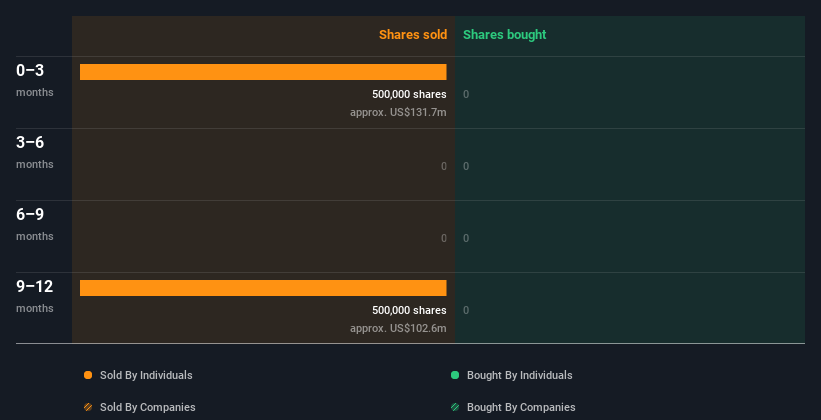Salesforce Sees Insider Stock Selling
Insiders were net sellers of Salesforce, Inc.'s (NYSE:CRM ) stock during the past year. That is, insiders sold more stock than they bought.
While we would never suggest that investors should base their decisions solely on what the directors of a company have been doing, we do think it is perfectly logical to keep tabs on what insiders are doing.
See our latest analysis for Salesforce
The Last 12 Months Of Insider Transactions At Salesforce
In the last twelve months, the biggest single sale by an insider was when the Co-Founder, Marc Benioff, sold US$132m worth of shares at a price of US$267 per share. That means that an insider was selling shares at slightly below the current price (US$308). We generally consider it a negative if insiders have been selling, especially if they did so below the current price, because it implies that they considered a lower price to be reasonable. While insider selling is not a positive sign, we can't be sure if it does mean insiders think the shares are fully valued, so it's only a weak sign. This single sale was just 2.0% of Marc Benioff's stake. Marc Benioff was the only individual insider to sell shares in the last twelve months.
Marc Benioff divested 1.00m shares over the last 12 months at an average price of US$237. You can see the insider transactions (by companies and individuals) over the last year depicted in the chart below. If you want to know exactly who sold, for how much, and when, simply click on the graph below!
If you like to buy stocks that insiders are buying, rather than selling, then you might just love this free list of companies. (Hint: insiders have been buying them).
Salesforce Insiders Are Selling The Stock
The last quarter saw substantial insider selling of Salesforce shares. In total, Co-Founder Marc Benioff sold US$132m worth of shares in that time, and we didn't record any purchases whatsoever. Overall this makes us a bit cautious, but it's not the be all and end all.
Insider Ownership
Another way to test the alignment between the leaders of a company and other shareholders is to look at how many shares they own. A high insider ownership often makes company leadership more mindful of shareholder interests. It's great to see that Salesforce insiders own 2.7% of the company, worth about US$8.2b. Most shareholders would be happy to see this sort of insider ownership, since it suggests that management incentives are well aligned with other shareholders.
What Might The Insider Transactions At Salesforce Tell Us?
An insider hasn't bought Salesforce stock in the last three months, but there was some selling. Looking to the last twelve months, our data doesn't show any insider buying. On the plus side, Salesforce makes money, and is growing profits. The company boasts high insider ownership, but we're a little hesitant, given the history of share sales. So these insider transactions can help us build a thesis about the stock, but it's also worthwhile knowing the risks facing this company. Every company has risks, and we've spotted 2 warning signs for Salesforce you should know about.
Of course Salesforce may not be the best stock to buy. So you may wish to see this free collection of high quality companies.
For the purposes of this article, insiders are those individuals who report their transactions to the relevant regulatory body. We currently account for open market transactions and private dispositions of direct interests only, but not derivative transactions or indirect interests.
Have feedback on this article? Concerned about the content? Get in touch with us directly. Alternatively, email editorial-team (at) simplywallst.com.
This article by Simply Wall St is general in nature. We provide commentary based on historical data and analyst forecasts only using an unbiased methodology and our articles are not intended to be financial advice. It does not constitute a recommendation to buy or sell any stock, and does not take account of your objectives, or your financial situation. We aim to bring you long-term focused analysis driven by fundamental data. Note that our analysis may not factor in the latest price-sensitive company announcements or qualitative material. Simply Wall St has no position in any stocks mentioned.

 Yahoo Finance
Yahoo Finance 
